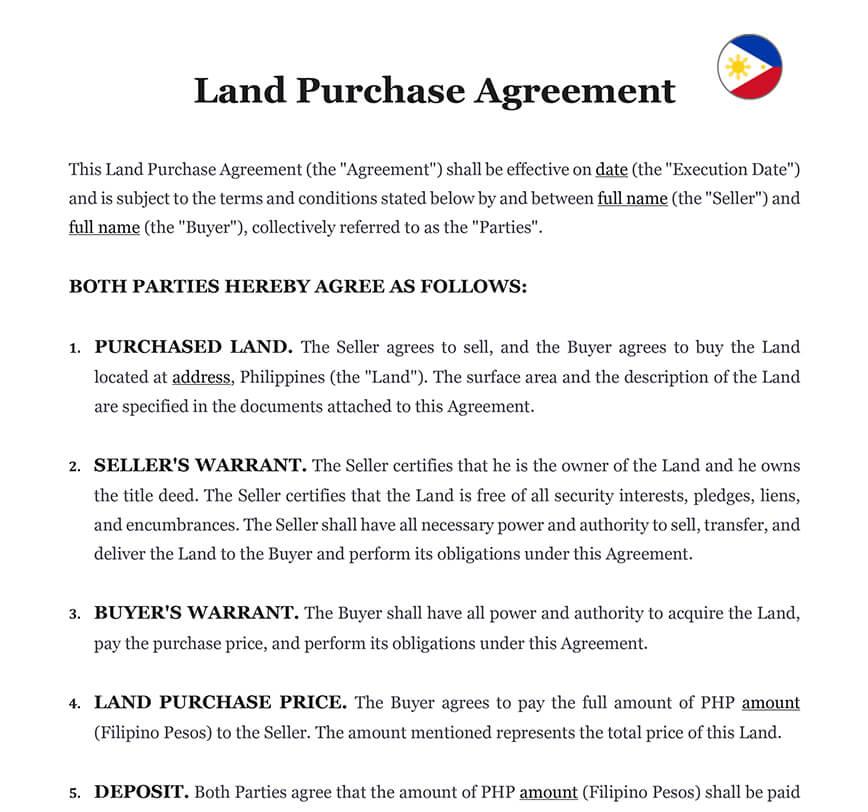
A Land Purchase Agreement is used by buyers and sellers to confirm their intent to enter into a transaction in the Philippines and to determine the obligations of both parties.

Word Document (.docx)

Ready to use legal template
Drafted by experienced lawyers
Compliant with Filipino law
Ready to use legal template
Drafted by lawyers
Compliant with Filipino law
Home › Buy a property › Land purchase agreement
A Land Purchase Agreement is a legally binding contract between a buyer and an original owner of land. The seller provides financing to the buyer for a mutually agreed price, with the buyer paying in subsequent installments. The main elements are the terms of the payment plan in the deed and whether or not there are covenants and assurances to the seller regarding the land. For more legal documents related to the purchase of a property, you can consult Property purchase contract or Letter of intent to purchase. For more legal documents related to buy a property, you can consult the Real Estate Purchase Agreement or the Intent to Purchase Letter.
A land contract, first and foremost, is an agreement between a buyer and a seller about a specific piece of property. Developers market and sell land in the same way that real estate agents do. Land contracts can be vast in nature, including both land and real estate on a single parcel. Many property contracts involve acquisitions that are funded by the seller. Some borrowers who buy land may also use a bank loan to fund the acquisition.
Second, a land contract specifies the particular conditions of the property transaction. In certain states, which have more flexible legal rights for land contract holders than others, land contracts can be vast in scope. As a result, the land buyer must guarantee that the provisions of the contract are legally binding in the case of a future dispute.
Third, land transactions are frequently designed to include seller financing. This can give a bigger universe of eligible borrowers since seller financing can sometimes allow purchasers who would not otherwise be qualified for a mortgage or investors who desire a speedier purchase than a mortgage. Seller financing decreases the number of parties engaged in the selling of the asset. Instead of making an upfront payment, the buyer might acquire a property straight from the seller through seller financing. The seller specifies the needed interest rate, the period of the arrangement, and any down payments in a seller financing agreement.
Second, seller-financed land contracts might contain a parcel of land or land and any property located on it. A land contract may contain a home, swimming pool, tennis court, basketball court, barn, or riding ring as assets. Any asset located on the property and included in the land contract will be influenced in pricing. The seller retains ownership of all assets until full payment is received, at which point the title is transferred to the buyer.
Finally, the seller frequently finances land contracts. A borrower may, however, seek regular bank financing for a land contract in particular instances. A borrower who wants to develop on land would like to finance the project with bank loans. The parameters of a land loan will often include a higher interest rate and a shorter duration. Land loans are sometimes arranged with a single sum payment rather than monthly installment payments. Builders who acquire a loan for land for real estate building with the greatest established collateral value are frequently able to refinance or pay off the loan with a loan.